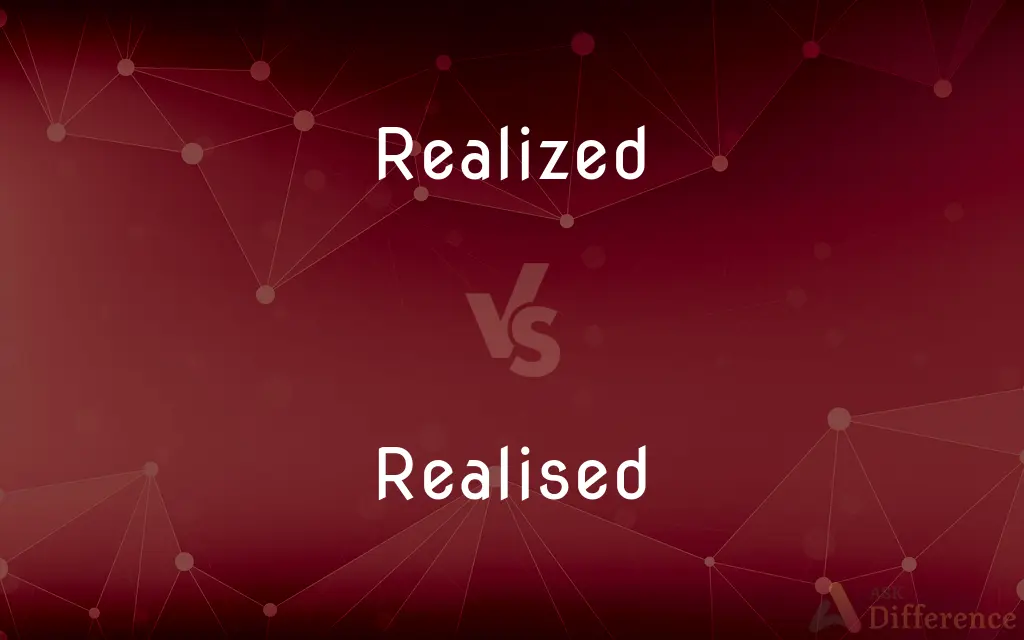Realized vs. Realised — What's the Difference?
Edited by Tayyaba Rehman — By Maham Liaqat — Updated on April 2, 2024
Realized is the American English spelling for acknowledging or achieving something, whereas Realised is used in British English.

Difference Between Realized and Realised
Table of Contents
ADVERTISEMENT
Key Differences
Realized and Realised refer to the same concept of becoming fully aware of something as a fact or developing into something greater. However, their usage differs geographically.
In American English, "realized" is the preferred spelling, used in contexts ranging from financial gains (realizing profits) to personal epiphanies (realizing one's potential). On the other hand, "realised" is the spelling adopted by British English, following the same rules of application but differing in orthography due to the linguistic evolution and standardization specific to the UK and its territories.
While both terms convey the act of making something real or acknowledging an understanding, the difference in spelling can also reflect the influence of English on a global scale. American English often adopts simpler spellings, whereas British English retains more traditional forms.
The choice between "realized" and "realised" extends beyond simple spelling preferences, influencing aspects of language such as software localization, academic writing, and international communications. It underscores the importance of context and audience in language use.
In digital and printed media, the prevalence of one spelling over the other can signal the intended reader base or the origin of the content, making spelling a subtle but significant indicator of cultural or regional alignment.
ADVERTISEMENT
Comparison Chart
Spelling Origin
American English
British English
Usage Context
Used in the United States
Used in the UK, Australia, and others
Language Evolution
Reflects American spelling simplification
Retains traditional British spelling
Localization
Preferred in American publications
Preferred in British publications
Global Influence
Influences international businesses and media
Indicates content tailored to British or Commonwealth audiences
Compare with Definitions
Realized
To understand or become aware of a situation.
Only later did he realize the significance of his actions.
Realised
To achieve (something one has been aiming for).
She realised her ambition to run a marathon.
Realized
To convert assets into cash or equivalents.
The company realized its investments to pay off debt.
Realised
To become fully conscious of (something) as a fact.
He realised the importance of his findings.
Realized
To bring into reality.
She realized her idea into a successful startup.
Realised
To convert assets into cash.
They realised their shares to fund the project.
Realized
To become fully aware of (something) as a fact.
She realized the extent of her power.
Realised
To make something a reality.
The team realised their plan with great success.
Realized
To achieve (something desired or anticipated).
He finally realized his dream of becoming a pilot.
Realised
To understand or become conscious of a situation.
She realised the mistake too late to correct it.
Realized
To comprehend completely or correctly.
Realised
(UK) realise
Realized
To bring into reality; make real
He finally realized his lifelong ambition to learn how to play the violin.
Realised
Successfully completed or brought to an end;
His mission accomplished he took a vacation
The completed project
The joy of a realized ambition overcame him
Realized
To make realistic
A film that realizes court life of the 1600s.
Realized
To obtain or achieve, as gain or profit
She realized a substantial return on the investment.
Realized
To bring in (a sum) as profit by sale.
Realized
To exchange holdings or goods for money.
Realized
Simple past tense and past participle of realize
Realized
Successfully completed or brought to an end;
His mission accomplished he took a vacation
The completed project
The joy of a realized ambition overcame him
Common Curiosities
Is "realised" incorrect in American publications?
In the context of American English, "realised" is typically considered a spelling error.
Is "realized" only used in American English?
Yes, "realized" is the American English spelling.
Why does American English prefer "realized"?
American English often adopts simplified spellings.
Does the difference in spelling affect the meaning of "realized/realised"?
No, the meaning remains the same; only the spelling differs.
Are there other words with similar American and British spelling differences?
Yes, words like "organize/organise" and "color/colour" have similar differences.
Can "realised" and "realized" be used interchangeably?
Yes, but the choice depends on the variant of English being used.
How can I remember which spelling to use?
Think of "z" for American English and "s" for British English.
Can software spell checkers identify the difference?
Yes, spell checkers can be set to American or British English standards.
Will using "realised" in the US be understood?
Yes, it will be understood but noted as British English.
How does digital communication affect the use of these spellings?
Digital communication exposes people to both forms, making both widely recognized.
Do "realized" and "realised" appear in English language tests?
Yes, understanding the correct usage is important for English proficiency tests.
Do publishers adjust spelling based on the target audience?
Yes, publishers often localize spelling to suit the target audience's preferences.
Does the difference in spelling reflect deeper linguistic differences?
It reflects historical and cultural variations in language development.
Are there contexts where one spelling is preferred globally?
American spellings are often used in international contexts, but it depends on the audience.
Is one spelling more modern than the other?
No, they simply reflect different standards of English.
Share Your Discovery

Previous Comparison
Boost vs. Bolster
Next Comparison
Foster vs. CultivateAuthor Spotlight
Written by
Maham LiaqatEdited by
Tayyaba RehmanTayyaba Rehman is a distinguished writer, currently serving as a primary contributor to askdifference.com. As a researcher in semantics and etymology, Tayyaba's passion for the complexity of languages and their distinctions has found a perfect home on the platform. Tayyaba delves into the intricacies of language, distinguishing between commonly confused words and phrases, thereby providing clarity for readers worldwide.













































